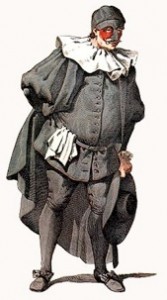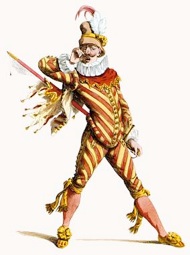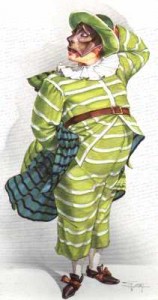Commedia Characters: (Il Vecchio: The Old Men)
In the cosmology of Commedia, there are three classes of characters:Â The Masters (those with money, often called Il Vecchio, the Old Men)Â The Servants (the zanni) who serve the Masters; and the Lovers (the Innamorati, who we introduced yesterday) There are a couple of characters who straddle the line one way or the other, and we’ll talk about them as we get to them.
Today we are discussing il vecchio, or old men. In the plots, these are the people who have servants, and who the servants often act on behalf of, and in the process often mess everything up.
The characters are of course archetypes and stock characters, but they also have their own little quirks, based on the actors that played them, and who imbued them with such characteristics. Sometimes it was based on a physical characteristic, or on an acting choice.
In standard discussions of commedia, people generally refer to 3 “master” characters. Pantalone, the old man who is a miser, and either wants to marry his daughter off to the highest bidder and is convinced that everybody is stealing from him. Il Dottore, a blowhard know it all who spouts gibberish in the name of science, and couldn’t tell his elbow from his knee if pressed; and Il Capitano (The Captain) a supposedly fearless mercenary who is always bragging of his exploits (both in war and in love) but faints at the sight of blood or women. I won’t go into a huge discussion of those characters, as more indepth information is available elsewhere. Here’s another good resource (in addition to some I mentioned yesterday)
The thing I want to point out is that there are many variations on these stock characters. For example, Pantalone is the miserly old man, but there are other old men characters– Tartaglia, the stutterer, who can’t get a word out edgewise (and sometimes is seen not as an old man, but as a zanni); or there could be a version of the old man who falls asleep at the most inopportune moments.
There were also a variety of captains and doctors, each with different traits. Each actor brought his unique sensibility to the character– made it their own. Sometimes those characters were indistinguishable from their lazzi (Tartaglia with his stuttering, for example) But each character was not just a character– they were brought to life by the actors.
Some of Il Vecchio needn’t be that old either– the Capitans (who were typically from out of town, French, Spanish, or Turkish, and spoke with a very funny accent) might be middle aged and just at the brink of being able to hire a servant.
And they needn’t be men either. At the Dell’arte school, we were taught to expand our ideas of gender of these characters– Pantalona could be an old woman lusting after money and young men– or Isabella (who was typically a lover’s name) could also be the hard-hearted black-spider widow.
The characters are stock, but they vary widely, depending on what the actor puts into them.
Here’s a video of Antonio Fava teaching about Il Capitano (It comes from a video that Fava did all about Commedia– the video is only available in Australia and costs around $150…)




Pingback: Commedia Cosmology: Masters, Lovers, and Servants